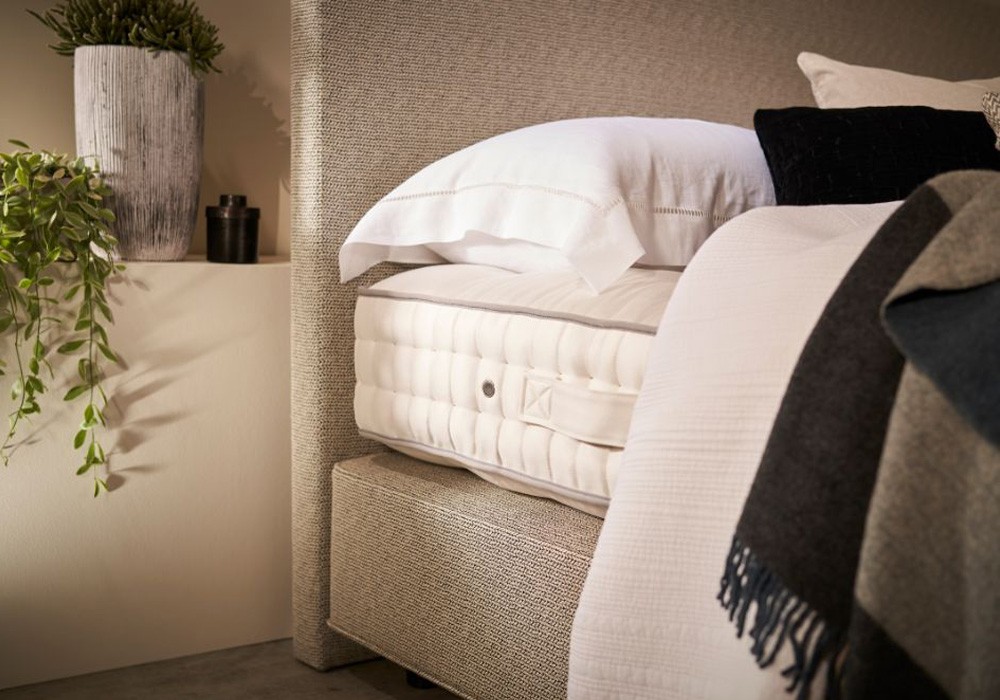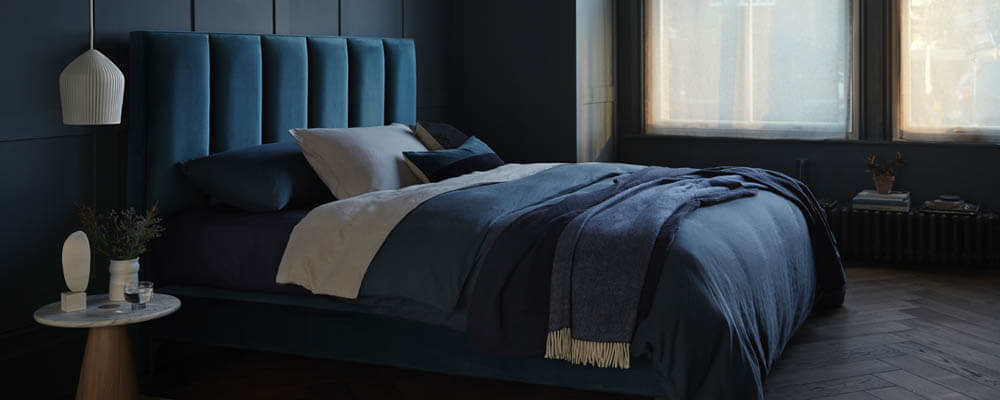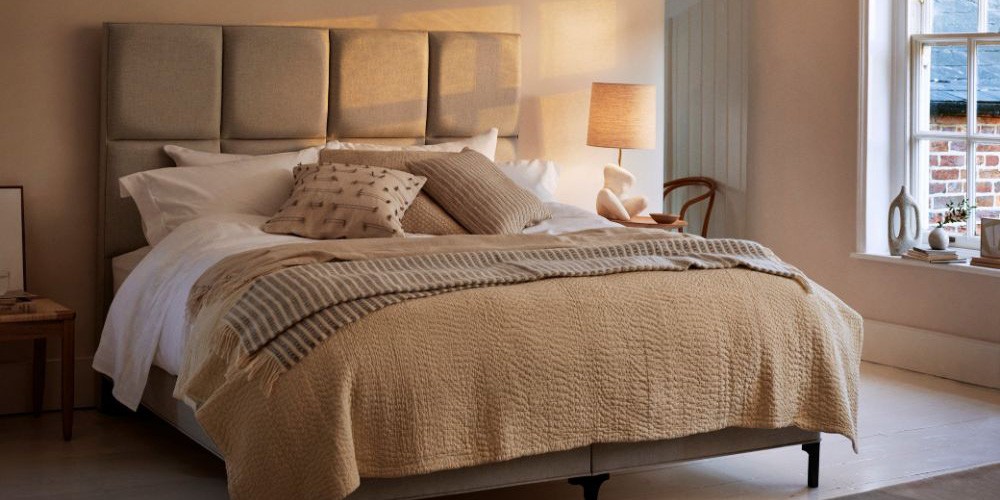When it comes to getting a great night's sleep, there are lots of factors to consider – from the firmness of your mattress and the mindfulness of your bedtime routine to just how many hours of sleep should we be getting each night? Thankfully, if you're struggling to get good-quality sleep or just want to improve your sleeping habits, there's lots of information and research out there to help you. We've narrowed down a few of these helpful ideas into 5 tips for better sleep in this quick and easy sleeping guide.

1. Check your mattress
Firmness - do I need a soft or a firm mattress?
Great sleep starts with a great mattress. Think about firmness and size. Fortunately, our friends over at Vispring provide a helpful guide to mattress firmness. Head over to our Mattress Care Guide and scroll down to What Firmness Should I Buy? for help with selecting your optimum level of comfort and support. Of course – it’s easier to get a feel for what mattress support level is right for you if you actually try them out. Visit us in-store if you’re in the market for a new mattress to try our mattresses out for yourself.
What size bed should I have?
The bigger, the better
Vispring's Independent Sleep Expert, Dr Neil Stanley, recommends getting the biggest bed that you can fit in your space. Here’s why. As a child, it’s likely you slept in a Single bed. These are usually a standard size at 90cm wide. A standard Double bed is 135cm wide. If you are sharing your bed with a sleeping partner, that leaves less than 68cm wide of sleeping space for each of you – over 20cm less than you’d get in a Single bed! Unless you buy a Super King bed (which is typically 180cm wide), you and your sleeping partner have less sleeping space than you would if you were sleeping in 2 Single beds. Obviously, not every home can fit a Super King size bed – that’s why Dr Neil Stanley recommends buying as big as you can for your home.
2. Follow the 3 R's - routine, relax & rest
Routine - set a sleeping schedule & stick to it
If you struggle to get off to sleep, establishing a regular bed-time and wake-time can be really helpful. Once you know what time you want or need to get up, count back the hours and establish an appropriate bedtime. Set this schedule and stick to it – even on the weekends.
Relax - make time to wind down before sleep
In our busy lives, it can be difficult to make time to switch-off properly before bed. But if your sleep is regularly disrupted, scheduling time to relax in the evening before heading to bed can really benefit your sleeping pattern. Vispring suggest starting to wind down 90 minutes before bed, while the Sleep Foundation suggests at least 30 minutes prior to sleeping. Some relaxation time is better than none. So whether it's reading a book, having a bath, yoga, meditation or some light stretching exercises - dedicating time to relax before bed is one of the best ways to prepare for a sounds night's sleep. Like you prepare for exercising by warming up, you can prepare for sleep by relaxing and winding down.
Rest - ensure your bedroom is calm & restful
Even though you can't exactly see your room while you are asleep, ensuring that your bedroom is a restful environment is one of the key ingredients for a good night's sleep. This includes:
- Light - is your bedroom dark enough? Does street lighting affect your room? Can you invest in blackout blinds or a sleep mask?
- Temperature - is your bedroom cool enough? Is it too hot? Do you need a fan or a blanket?
- Sound - is your bedroom quiet? Do traffic or loud noises wake you in the night? Can you purchase earplugs?
Don't forget bed linen, pillows and duvets. Perhaps lighter-weight or more breathable options are required. Choose bed linen that's soft and comfortable while also fitting the style or colour scheme of your room.

3. Think about what you are doing during the day
Our lifestyle habits during the day could be having an effect on the way we sleep at night. Not only can limiting our intake of things such as caffeine, sugar and alcohol help us to sleep better, but it can help us create a more healthy lifestyle too.
Drinks - limit caffeine intake (especially later in the day)
If a tea or coffee is your regular evening go-to, try swapping these for caffeine-free alternatives such as decaf or herbal teas. While you may not realise it, the caffeine in tea and coffee may be affecting the quality of your sleep. And while the idea of a 'nightcap' sounds lovely, the Sleep Foundation points out that drinking alcohol right before bed actually "affects the brain in ways that can lower sleep quality".
Exercise - get some fresh air
Incorporating exercise into your daily routine is not only beneficial for your health, but it's good for your sleep too. Saying that, we wouldn't suggest vigorous exercise too close to bedtime. Whether it's a lunchtime walk, a morning jog or a simply pulling back the curtains and letting in some natural light, the act of simply taking in some fresh air and feeling the sunlight on your face can contribute to better quality sleep and habits.
Naps - take short naps with caution
Napping is tricky. While a short nap provides some with a pick-me-up during the day, too long a nap can be disruptive to getting a good night's sleep. The Sleep Foundation urges caution with napping. They suggest that if you have to nap, do so shortly after lunch in the early afternoon for no more than 20 minutes.
How much sleep should I be getting each night?
Is 7 hours of sleep enough?
It's commonly assumed that the average adult should be sleeping for approximately 8 hours each night in order to feel sufficiently rested. Health websites such as the NHS and the National Sleep Foundation recommend between 7 and 9 hours for adults aged 18-64. So while 8 hours is a good guideline, you may find that you require more or less sleep to be alert and awake during the day. Even Dr Neil Stanley says that he needs 9 to 9 and a half hours sleep to feel at his best - and that's coming from an Independent Sleep Expert.
4. Put away technology
Ban blue light from the bedroom
Blue light is light with blue wavelengths. It is omitted from the sun, LED and fluorescent lighting as well as electrical items such as phones, tablets and televisions. During the day, sources of blue light can be helpful in boosting mood and attention. It is designed to stimulate and keep you awake. So you can see why blue light is a huge no-no before bedtime. New technology - especially on phones and tablets - allows settings where blue light can be filtered out so that digital screens are less impactful on your eyes. However, if possible it's ideal not to have any technology items in your bedroom at all. This helps your brain to associate this space with bedtime and sleep.

5. Don't just lie there
If you can't sleep, take your mind off it by doing something else
We've all been there - staring at the ceiling during the small hours of the morning, willing sleep to come as we quietly watch the hours count towards our beckoning alarm. If you can't simply can't sleep, then don't try to. Focus on something other than not-sleeping. Hypnos suggests getting up and doing something else if you can't sleep after 15-20 minutes.
If your mind is whirring from one thought to the other or busy thinking about what's on your agenda for the next day, then why not try jotting it down or making a list on paper? If you're not feeling sleepy, read under low light or do some breathing exercises to relax. You'll likely find that distracting yourself from not-sleeping with an easy, relaxed activity will bring about sleep much more quickly than if you lie there and think about how many hours are left until you wake.
